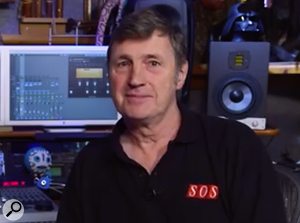When a musician takes an interest in home recording, or makes the transition from old-school recording hardware to the wonderful world of computers, the question we hear most frequently relates to the choice of DAW software. If you were to take a look at the various forums, you’d find endless gripes aimed at what a particular DAW can’t do that one or two of the others can, but let’s take a reality check; even the most basic DAW runs rings round the studio of old when it comes to editing, processing, mix automation and recalling projects, and all the major players in the DAW market offer everything needed to record, process and edit great music. Even budget DAWs such as GarageBand can do things I never dreamed possible when I bought my first four-track back in the 1970s.
 The main exception to the ‘conventional’ DAW paradigm is Ableton Live, which is geared up to make loop-based music easy to record and manipulate, but then GarageBand for iOS has taken on board some of those ideas too. Many musicians use both Live and a more conventional DAW, moving work between them as appropriate, so there’s nothing to say you have to use only one piece of music recording software. Indeed, if you aspire to a career in the industry, a passing acquaintance with all the main DAWs is a distinct advantage, because what appears to be an ‘industry standard’ in one area of audio often isn’t in other areas.
The main exception to the ‘conventional’ DAW paradigm is Ableton Live, which is geared up to make loop-based music easy to record and manipulate, but then GarageBand for iOS has taken on board some of those ideas too. Many musicians use both Live and a more conventional DAW, moving work between them as appropriate, so there’s nothing to say you have to use only one piece of music recording software. Indeed, if you aspire to a career in the industry, a passing acquaintance with all the main DAWs is a distinct advantage, because what appears to be an ‘industry standard’ in one area of audio often isn’t in other areas.
So, my answer to the ‘which DAW?’ question is usually to find out what your friends use and go with that, as they can help you level out the learning curve and also help you with more advanced advice when you’re ready for it. But unless you start with a 'light' version of the program, be prepared for a few head-scratching moments, as today’s DAWs can do so much that there’s a fair bit to learn. Fortunately, you can usually start out just using the basics and then explore the more exotic features as you come to realise you need them.
Then there’s the Mac versus PC quandary that often follows on the heels of the DAW question. Macs are expensive and the upgrade path is very limited, but if you choose to use Apple software such as Logic Pro or GarageBand, the low cost of the software offsets some of the additional price of the hardware. Also, Apple computers tend to be easier to manage than Windows machines if you’re not familiar with the murkier depths of computer tech. If the software of your choice can run on either platform and PCs don’t scare you, then it might be worth investing in a bespoke PC built specifically for music as you can get a lot of power for your money that way. If it is Mac-only or Windows-only, then the choice is made for you.
Whichever way you go, and despite the occasional frustration that results from anything that relies on a computer, today’s DAWs are staggeringly good and most people who use them would never consider going back to the way things were. I certainly wouldn’t.
